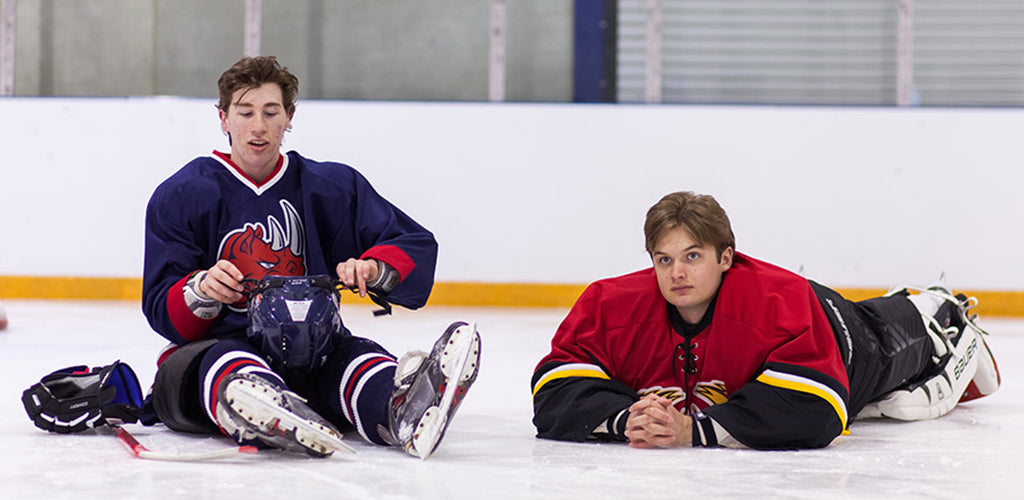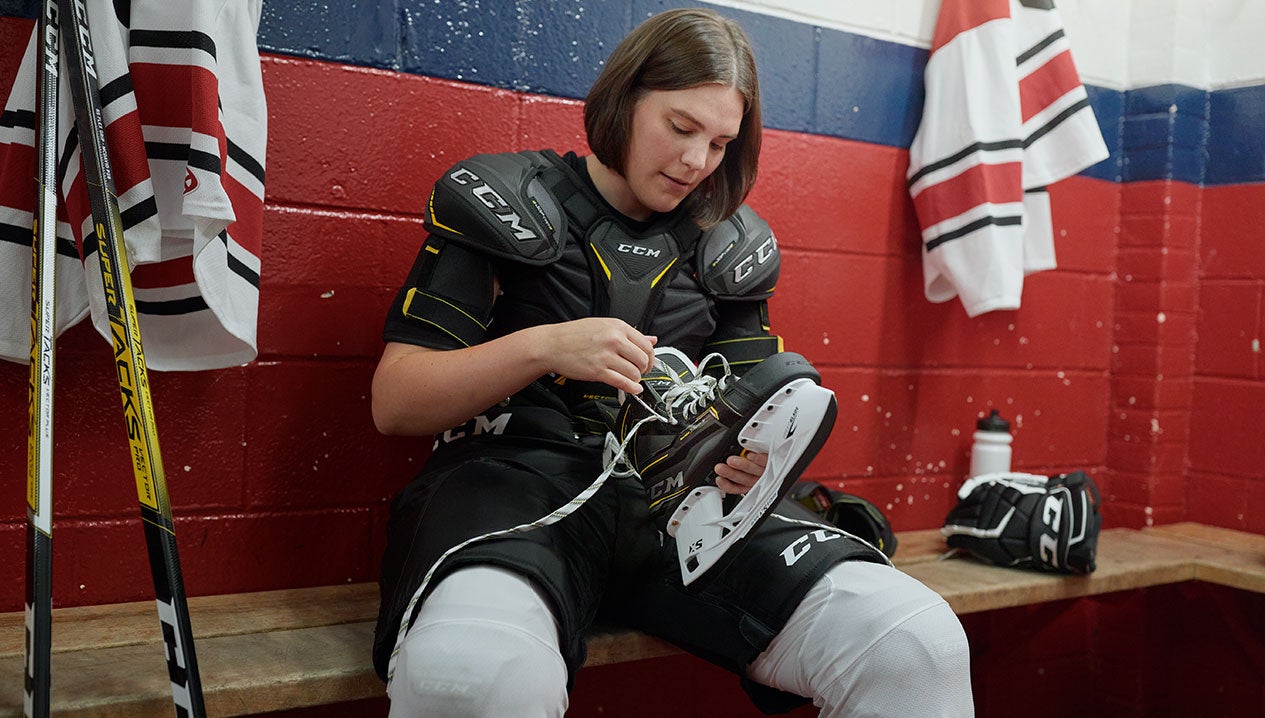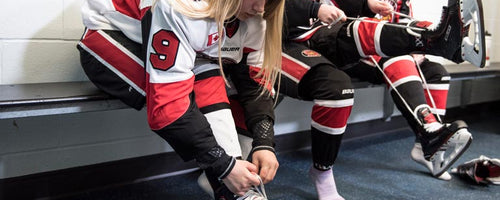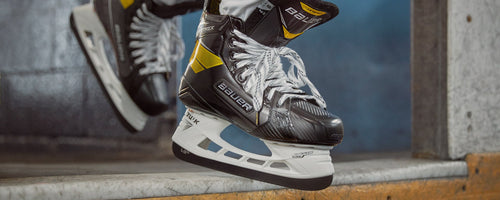Nutrition for Hockey Players

With constant changes in speed and direction, high intensity and full body contact at some levels, ice hockey players need a large amount of fuel to keep their energy high during the game.
Advantages of proper nutrition and hydration for hockey players before, during and after a game.
- Tops up energy before a game;
- Delays fatigue during the game;
- Prevents decline in skill performance and mental concentration on the ice;
- Repairs the wear and tear on muscles;
- Provides nutrients to recover and prepare for the next training session or game.
Nutrition and hydration before the game
Nutrition: The purpose of the pre-game meal is to provide an easily digested source of energy to be focused during the game and prevent being distracted by hunger. As a general rule, you want to focus more on carbohydrate-rich foods and less on protein as you get closer to your game to avoid feeling uncomfortable, stomach cramps, or skating with legs that feel sluggish. Carbohydrate-rich foods include bread, cereal, rice, pasta, fruit, and dairy products. Here are examples of pre-game meals and snacks, but you should stick to foods that you are familiar with.
Time Before the Game |
What |
Example |
3-4 hours |
Regular, full balanced meal
|
2 cups pasta topped with ¾ cup tomato sauce and 4 lean (2oz) meatballs |
2-3 hours |
Smaller meal
|
Tuna sandwich with vegetables and a fruit |
1-2 hours |
Snack
|
1 ½ cup lower fibre breakfast cereal with ½ cup reduced fat milk (skim, 1% or 2%) and a fruit |
Less than 1 hour |
Small snack
|
|
Hydration: Drinking liquids prior to the game prevents dehydration during play caused by sweating under your heavy gear. As a rule of thumb try to consume 500-1000 ml (2-4 cups) of water within the 2 hours preceding a game. Water is the most easily digestible and fastest hydration; other hydration beverages take longer for your body to break down, so should be consumed hours before the game so the electrolytes can be accessible to your body’s needs during a game, and then after a game to replace those essential electrolytes lost during exertion.
Nutrition and hydration during the game
Nutrition: Foods eaten during a game need to be digested easily while offering enough energy to fuel your muscles, brain and nervous system. This means you need to choose carbohydrate-rich foods that are low in protein, fibre and fat. It is recommended to consume 30-60 g of carbohydrates per hour of exercises. This can be achieved by consuming fruit, sports bars and drinks, diluted fruit juice, granola bars, cold cereal, pretzels, or crackers, all of which can be easily packed in your hockey bag.
Hydration: Dehydration can impair mental and physical performance. Most players will need 400 to 800 ml of liquids for every hour of exercise to account for fluids lost with sweat. Do not use thirst to dictate when you should drink as we don’t perceive it as well during a game. Also, a player may already be dehydrated before becoming thirsty! Although it seems like a lot of liquid to drink, it can easily be reached by taking 4 large sips of water or sports drink every 20 minutes.
Nutrition and hydration after the game
Nutrition: Your priority here is to replenish your energy stores and repair any muscle and tissue damage. After your game, it is important to eat a meal or snack within 30 minutes of your game and again 1-2 hours after that. All meals and snacks should have a 4:1 ratio of carbohydrates to protein. This translates to 1-1.5 grams of carbohydrates for every kg of body weight and 0.2 to 0.4 grams of protein for every kg of body weight. For example, a 70 kg athlete will need 70 to 105 grams of carbohydrates and 14 to 28 grams of protein within 30 minutes and again 1-2 hours after. Some post-game meals and snacks include:
- Fruit, yogurt, and granola
- Peanut butter sandwich and a banana
- Chocolate milk, cheese string and a fruit
- Pasta with meatballs, side dish of vegetables
- Chicken stir-fry on rice with vegetables
- Egg or tuna sandwich with vegetables
- Protein powder shakes
Hydration: After a game, drink 1-1.5 L of fluid for every kg of body weight lost. To get this number, weigh yourself before and after a practice or game to determine your weight lost and then multiply it by 1-1.5 to get amount of fluids in liters to consume.
Should my child follow the same requirements as a competitive athlete?
Although we believe our children are the next NHL superstars, nutrient requirements for young players are different. First, our children are a lot smaller than adult professional or competitive athletes, which means that their energy and nutrient needs are lower as well. Second, the game as well as the season is shorter in length. A professional hockey game can take up to 3 hours in total whereas a game in the minor league can be as short as 40 minutes. And most youth players do not play the 82 games a professional player does.
This is not to say that proper nutrition is not important, but rather that the best strategy for our children is to follow a healthy, balanced diet without having to calculate exact nutrient needs. Children playing hockey should eat 3 meals and 2 snacks per day, which include grains, quality protein, fruit, vegetables and dairy products. As a parent, make sure to offer a wide variety of nutritious meals, snacks and beverages before, during and after the game.
Note: The information included is based on the best available evidence at the time and may not be applicable for all athletes. Please consult your local dietitian to get personalized advice.
For expert advice on hockey gear and equipment that is right for your game, level of play, and budget, come see us at your local Source for Sports hockey store near you. We Fit Your Game.
Sources:
Burke, L., Hawley, J., Wong, S., & Jeukendrup, A. (2011). Carbohydrates for training and competition. Journal of Sports
Holway, F., & Spriet, L. (2011). Sport-specific nutrition: Practical strategies for team sports. Journal of Sports Sciences.
Jeukendrup, A., & Killer, S. (2010). The Myths Surrounding Pre-Exercise Carbohydrate Feeding. Ann Nutr Metab Annals of Nutrition and Metabolism, 18-25.
Phillips, S., & Loon, L. (2011). Dietary protein for athletes: From requirements to optimum adaptation. Journal of Sports Sciences.
Position of the American Dietetic Association, Dietitians of Canada, and the American College of Sports Medicine: Nutrition and Athletic Performance. (2009). Journal of the American Dietetic Association, 509-527.

Zeina is a registered dietitian-nutritionist and is part of l’Ordre professionnel des diététistes du Québec. She currently works at Le Fitness Loft Kinesiology Clinic in Dorval where she consults an active clientele that desires to change their lifestyle habits, whether it is to lose weight, increase muscle mass, improve performance or simply live healthier. Zeina has a passion for teaching and conveying her knowledge about overall healthy eating habits and makes sure every client receives personalized recommendations based on their lifestyle and preferences.
Join Source Nation to get the latest news on product launches, Source Exclusive product lines, tips and tricks for parents and players, and more!



